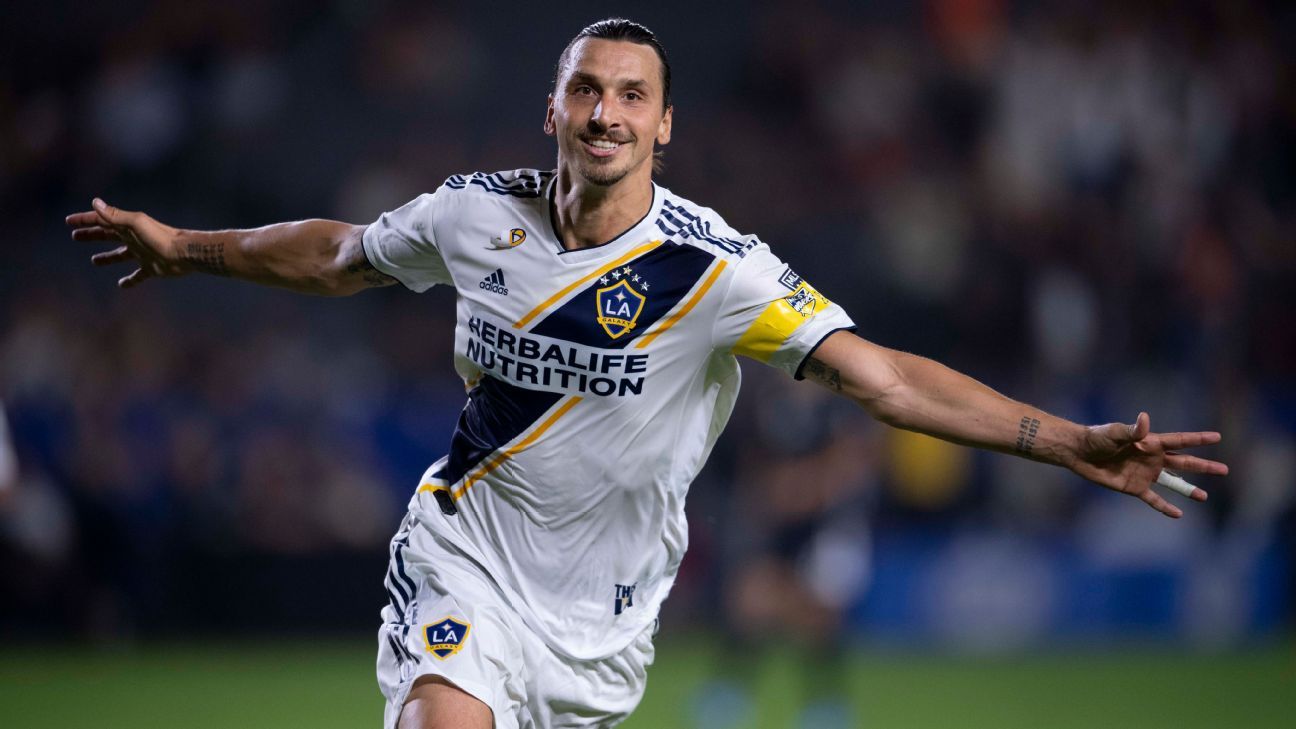
Never has a player performed the role of villain better than Zlatan Ibrahimovic, with his quips and his elbows as razor sharp as his finishing. And let's face it, MLS needs villains even more than it needs heroes. In a league that too often is vanilla when it comes to on-field play, Ibrahimovic was a habanero pepper smothered in tabasco.
Around the world, every import is saddled with the question of "Will he settle?" Yet Ibrahimovic showed that query didn't apply to superhumans such as himself, single-handedly adding liquid oxygen to a budding intra-city rivalry with LAFC and igniting it with practically his first touch. And when he was done, he left in much the same manner as he arrived, with bombast and a wink at the same time.
His goals in MLS are indelible, from his 40-yard dart on his debut against LAFC to his karate kick against Toronto FC for his 500th career goal to his bicycle kick against New England. His antics were too, though the likes of LAFC defender Mohamed El-Munir, who needed surgery following an elbow to the face while Ibrahimovic went unpunished, and RSL's Nedum Onuoha weren't at all amused. As for his verbal broadsides, the league probably wasn't a fan of his "I'm a Ferrari surrounded by Fiats," comment, but it got people's attention, as did his remark that Los Angeles could "go back to watch baseball" upon his departure from the LA Galaxy.
The fans loved Ibrahimovic as he signed every autograph, posed for tons of photos and even held a baby or two. He made every Galaxy game a must-see event. But will the Galaxy miss him?
His former club will miss his 30 goals. They'll miss the tickets he sold and the way he helped make the Galaxy and the sport relevant in as fickle a sports town as there is on the planet. As for the baggage that came with him, not so much. Multiple sources said that defender Gio Gonzalez, a midseason acquisition, was never the same after getting verbally lit up by Ibrahimovic shortly after his arrival. Of course, everyone got the hairdryer treatment from the big forward at one point or another, such was the sledgehammer force of his personality.
At U.S. national team camp in Orlando, Sebastian Lletget was asked about Ibrahimovic's departure. It spoke volumes. "Oh, Ibra? Oh man, that guy... I wish him the best, dude. It was a good run." In a sense, this sentiment applies to the devil's bargain the Galaxy made when they signed him. There is only so much Zlatan a team can take before the law of diminishing returns sets in. There's a reason that his longest stint at any one club was four years with Paris Saint-Germain. In most cases, two seasons was enough.
The timing of his departure from the Galaxy feels right for all parties involved. The Galaxy can now begin to retool its roster without the tactical anvil, or the financial constraint, of having Ibrahimovic in their lineup. Manager Guillermo Barros Schelotto can actually have his team press defensively when and if the situation warrants, a tactic Ibrahimovic would never apply. They'll need to find a forward to replace his output but it will no doubt be someone who's more mobile and certainly won't equal the $7.2 million hit on the Galaxy's wage bill. The offensive load can be spread out among several player instead of the everything been drawn towards Ibrahimovic's gravitation pull.
Most important of all, the end of the Ibrahimovic Era will allow the Galaxy to invest in the weaker aspects of the roster, including a dedicated defensive midfielder that would free up Jonathan dos Santos to move further upfield. The backline was a shambles for much of the season -- expect money to be spent there as well -- but it will be interesting to see if some performances will improve now that Zlatan is gone.
As for MLS, the league finds itself without a big-name European star player for the first time since 2007 when David Beckham arrived, though there is plenty of time for that to change in this offseason. (And no, Thierry Henry joining the managerial ranks with the Montreal Impact doesn't count.)
The presence and subsequent departures this year of Ibrahimovic, Bastian Schweinsteiger and Wayne Rooney shows that the league still has an affinity for star power and one suspects they will go down that road again, but MLS is clearly in a better place than it was before Beckham arrived, be it the 16 teams that have been added (or are set to be added), the numerous stadiums and training facilities, and the higher quality of players.
Zlatan didn't create the momentum that the league was experiencing; he merely accelerated it. But MLS survived the departures of Beckham, Henry et al and the same is true with regards to Zlatan, regardless of his final cutting remarks. After all, next season marks the league's 25th season and two new teams, including Beckham's Inter Miami, will enter the fray and invariably sign star power of their own.
Was MLS better for having Zlatan around? You bet. But the game waits for no one, and come next season, a new set of heroes and villains will need to emerge.















 Phone: (800) 737. 6040
Phone: (800) 737. 6040 Fax: (800) 825 5558
Fax: (800) 825 5558 Website:
Website:  Email:
Email: 






